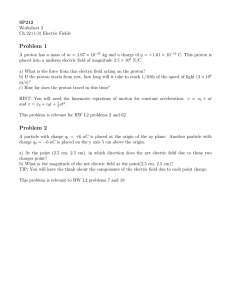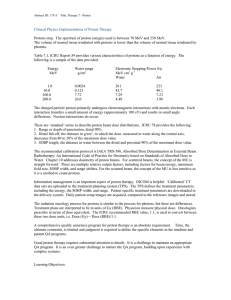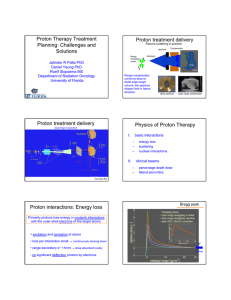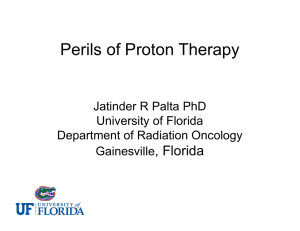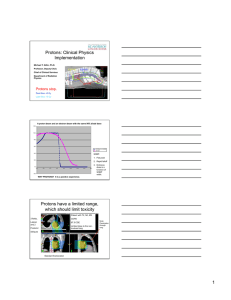Promises and Perils of Proton Radiotherapy py Uncertainty Issues for non-moving Targets
advertisement
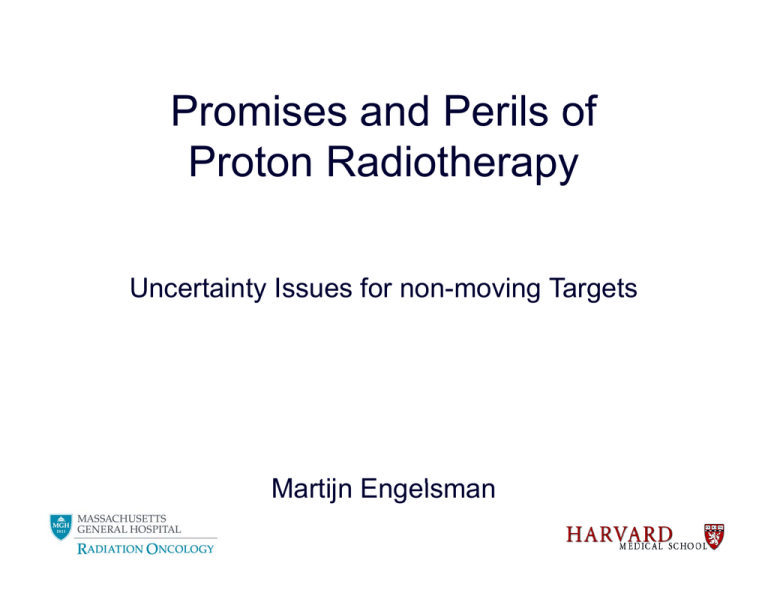
Promises and Perils of Proton Radiotherapy py Uncertainty Issues for non-moving Targets M tij E Martijn Engelsman l The promises The Promises: Lower upstream dose No downstream dose 2 The perils The Peril: Finite Range ! ! ! 3 P t Mindset Proton Mi d t CT-scan 4 Hounsfield units conversion Electron Density Protons Proton stopping pp g p power Relative stop pping power Photons TPS 1.5 1 5 Plastics Tissues 1.25 1 0.75 0.5 0.25 0 25 0 -1000 -750 -500 -250 0 250 500 CT Value 5 750 1000 1250 1500 3.5% plus 1 mm Proton beam 3.5% plus 1 mm 6 CT artifacts High-density streak artifacts Density override Contrast / Onyx y g glue Multiple CT-scans Density override 7 Patient hardware Correct for Titanium 8 CT reconstruction circle Centered FOV = 50 cm Not centered FOV = 50 cm 9 Not centered FOV = 65 cm Prostate example • • Consider C id re-scanning i ffor ttreatment t t planning l i Consider prescribing a diet 10 Lung example Arm position •Limits beam directions •Reproducible setup? AP and PA fields •Skim Ski d density it surface f •With smearing exit dose 11 P t Mindset Proton Mi d t Target Delineation 12 Target delineation Steenbakkers et al. Radiother Oncol. 2005; 77:182-90 200 180 160 Dose (%) 140 120 100 80 60 40 Photon (10MV) Proton SOBP (18cm) 20 0 0 5 10 15 Depth (cm) • • Protons: Reduced proximal and zero distal dose Treatment day y field combination dependent 13 20 25 30 P t Mindset Proton Mi d t Dose Calculation 14 Pencil beam vs Monte-Carlo Monte Carlo Treatment Planning system Dose difference H. Paganetti g et al. 15 Patching + 3 mm 2 mm 1 mm 0 mm 16 Patching: multiple match lines 17 P t Mindset Proton Mi d t Patient Alignment 18 Hardware proximity Airgap llarger th Ai then planned: l d • Increased aperture projection • Increased penumbra due to scatter in Range Compensator Dosimetrist training / understanding 19 Smearing for setup errors High-Density Structure Target Volume Beam Critical Structure Range Compensator Body Surface A Aperture t 20 Smearing for setup errors High-Density Structure Target Volume Beam Critical Structure Range Compensator Body Surface A Aperture t 21 Setup verification • Any “photon” approach can be a proton approach e approach, e.g. g – Orthogonal X-rays + DRRs – Ultrasound – AlignRT • Conebeam CT – Full 3D patient alignment – Observe density changes 22 Shape changes of patient and tumor Mischa Hoogeman, Erasmus MC 23 Shape changes of patient and tumor Before RT After RT E. M. Vasques Osorio et al. IJROBP 70: 875-82 24 Other density changes • • • • Patient weight gain / loss Filling up of sinuses (Sub-clinical) pneumonia W t hair Wet h i / gell / hairspray h i Lei Dong, MDAH 25 “Catch” substantial density changes • • • • • • Measure patient weight Ali RT AlignRT Tightness of immobilization device Physician follow-up Repeat CT CT-scanning scanning Conebeam CT Currently: Unknown clinical importance 26 P t Mindset Proton Mi d t Dose Delivery 27 Double whammy Same number of MU for each SOBP 28 P t Mindset Proton Mi d t Dose Evaluation 29 PTV in particle therapy Tumor PTV Distal margin not needed for setup errors 30 PTV in particle therapy Planned dose Delivered dose Please see Lei Dong’s g p presentation for PTV for e.g. g lung g tumors 31 Batched field delivery: Prostate Left femoral head 9 Gy 32 Batched field delivery: Chordoma Brainstem 33 Proton mindset necessary in: • • • • • • CT-scan T Target delineation d li i Dose calculation Patient alignment Dose delivery Dose evaluation 34 Ten year vision • Acquire Proton CBCT prior to every fraction. – low dose – 3D / 4D proton stopping power information – Accurate patient alignment • Automatically draw (progress) target volume and normal tissues – How about biological information? • On-line plan re-optimization and then delivery – Pencil Beam Scanning is obviously required for this. 35 Conclusions Think Density, Densit Densit Density, Densit Density … It’s high time to accurately assess the effects of intra-treatment course density variations 36
